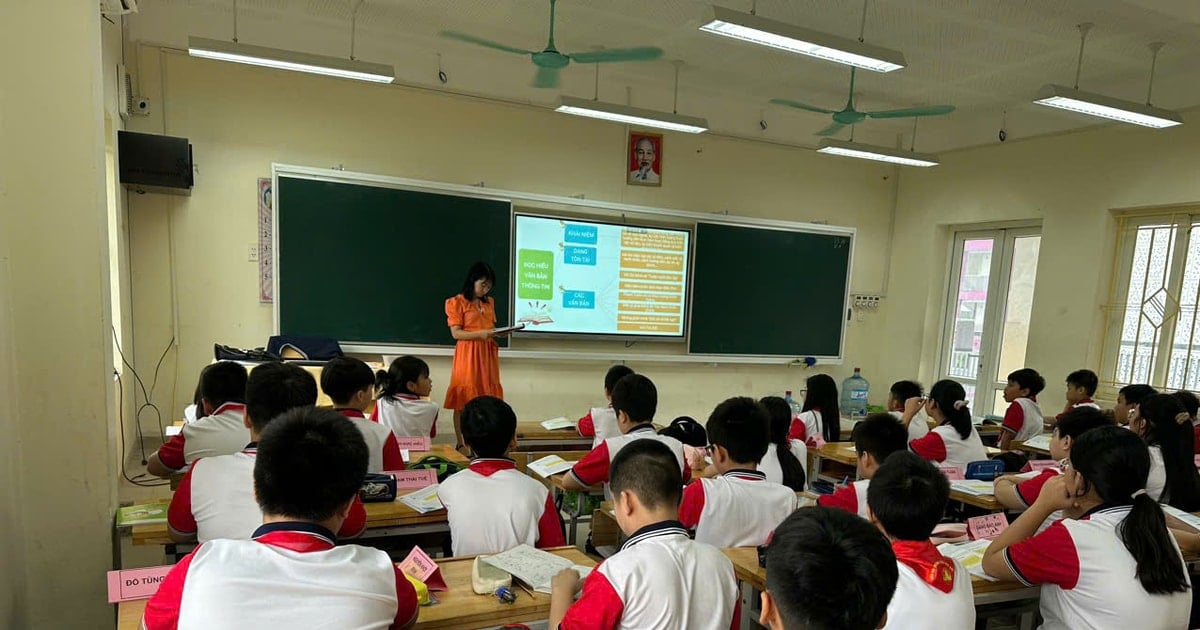Although supported but still has many limitations, should the IELTS teaching model in schools be widely replicated? With experience in teacher training and teaching in both public and private sectors, Master Khuu Hoang Nhat Minh, Director of Development and Academics at Origins Language Academy, believes that it is necessary to consider carefully before deciding to teach IELTS, especially in the preparation of curriculum and coordination of teachers and classes.

To effectively prepare for the IELTS test, teachers need to meet three criteria: language proficiency, pedagogical competency and knowledge of the test.
Specifically, to effectively prepare for the IELTS test, teachers need to meet three criteria: language proficiency, pedagogical proficiency, and most importantly, knowledge of the test. "Good test-taking techniques can help candidates increase their score by one point. However, it will be very dangerous if teachers do not understand IELTS well, ignore language development for students, and only guide test-taking techniques throughout the three years of high school," Mr. Minh noted.
As for native teachers, schools need to have appropriate arrangements instead of completely entrusting them with IELTS test preparation. Because, it is rare to find native teachers in Vietnam who possess good pedagogical skills, and it is even more difficult to find someone who really understands IELTS because they do not need to take this exam. "Teaching multicultural thinking, correcting pronunciation or guiding natural speaking like native speakers are some suitable positions for them," Master Minh suggested.
Regarding the coordination of IELTS classes in high schools, Mr. Minh said that it is necessary to test the ability and differentiate students into groups with the same level, instead of teaching the whole class. At the same time, the school needs to arrange a suitable ratio between the number of general English lessons and English exam preparation lessons, such as 70:30 in grade 10 and vice versa in grade 12, when students have a solid foundation and start to "race" to take the exam to get a certificate.
Master Vo Dao Phu Si, a lecturer at a public university in Ho Chi Minh City, assessed that there should be a variety of resources to support teachers so that they can do a good job of teaching IELTS in schools, in parallel with teaching the main curriculum. Because teachers who do not have good pedagogical skills will have difficulty teaching large classes of students with different levels of foreign language proficiency.
According to Mr. Si, teachers need to be trained by experts who have knowledge of IELTS testing to fully understand the content and structure of the test, thereby conveying them to students instead of just teaching tips or tricks.

There needs to be a variety of resources to support teachers so that they can do a good job of teaching IELTS in schools, alongside teaching the main curriculum.
Dr. Nguyen Vinh Quang, majoring in educational management at the University of Hertfordshire (UK), currently the Director of Mr.Q International Vocational Education Organization, also stated that teachers are the important "link" that determines the success or failure of teaching IELTS in schools because not many high school teachers have ever been exposed to this test.
In terms of program management, Dr. Quang recommends that schools should clearly explain to parents at the beginning of the year the reasons for teaching foreign language certificates, and why IELTS. In addition, with English teachers currently teaching IELTS outside, schools should also learn and coordinate to avoid conflicts in teaching methods.
Another notable issue is that schools need to consider diversifying their options, instead of focusing on training for a single certificate. Specifically, Dr. Quang suggested having a maximum of three popular options, such as IELTS, TOEFL or Cambridge. "Avoid recognizing and teaching too many certificates because it will lead to chaos in operations, as well as conflicts between exam organizations," Mr. Quang noted.
Source link












































Comment (0)